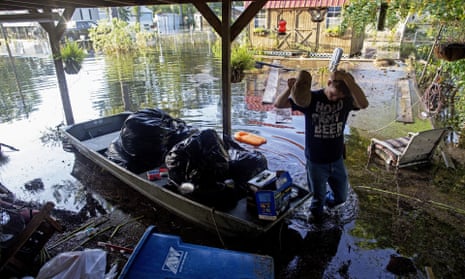Louisiana governor John Bel Edwards pleaded for aid for his state on Sunday, saying that after a week of devastating flooding, “we really need help.”
Unlike a hurricane, Edwards told CNN on Sunday, “this rain event didn’t have a name, so we have folks around the country who I think are just now realizing how significant it was.”
Days of extraordinary rainfall caused severe flooding around southern Louisiana this week, killing at least 13 people, damaging an estimated 60,000 homes and forcing thousands to the shelter of evacuation centers. More than 100,000 people had registered for federal assistance by Sunday, even as waters slowly receded and many families returned home to find furniture broken and caked in mud, walls weakened by water and early signs of mold spreading through their rooms.
“Typically by this point in a storm, I think Red Cross would be receiving a lot more donations; I think there would be more volunteers signing up,” Edwards said. “It would be very helpful for people to donate to the Red Cross, to the Baton Rouge area foundation, and also to come in and volunteer to help people get back into their homes as quickly as possible.”
In the small town of Lake Arthur, east of the Lacassine wildlife refuge, authorities barred residents from returning home as teams piled sandbags and worked pumps, struggling to keep the floodwaters out of more homes.
In St Amanat, one of the worst-flooded towns of southern Louisiana, teams continued to go door to door in search of survivors and bodies on Sunday. “It’s much worse than I expected,” resident Sheila Siener told the Associated Press. “The water, the dirt, the smell. Water in the cabinets. Everything’s filthy. I’ve never been through a flood, so I really didn’t know.”
About 25 miles away in Denham Springs, floods unearthed graves and damaged tombs at one of at least 15 cemeteries in the region that were affected by the rains. Resident Willie Brooks III found that his mother’s vault had vanished. “The vault was completely gone,” Brooks said. “It could be down the street. It could be in the Amite River. I don’t know.”
Though caskets are almost annually disinterred by floods in the lowlands of Louisiana, Brooks said he had never personally seen it. “It’s like a horror movie.”
Last week, Barack Obama declared the flooding a major disaster and opened access to federal funding for the parishes of East Baton Rouge, Livingston, St Helena, and Tangipahoa.

Edwards praised the federal government for its help in the recovery, saying that Barack Obama granted his request for disaster aid within a few hours, and quickly called the governor to ask how he could help. “I don’t have any complaints at all about the relationship,” Edwards said, adding that the Federal Emergency Management Agency (Fema) had offered timely aid.
But he stressed that the work was not over: “This is going to take many months.”
The president was criticized by Republicans this week for his response to the disaster, and allies of Republican nominee Donald Trump said Obama had failed to act appropriately by rushing to the state. Trump briefly visited St Amant on Friday and his campaign said he had donated $100,000 to the Greenwell Springs Baptist church, though when called by the Guardian the church did not immediately confirm it had received the money.
Edwards, a Democrat, was diplomatic when asked about Trump’s visit and defended Obama’s response. The governor said he was glad that Trump’s visit “helped to shine a spotlight on Louisiana and the dire situation that we have here” and that he “appreciated the good phone call, the conversation I had with Governor [Mike] Pence,” Trump’s running mate.
He also clarified that Obama had asked him early last week when would be the best time to visit. “I asked him to wait until the response was over and we got into the recovery phase,” Edwards said, explaining that he did not want to divert police officers and state troopers away from rescue efforts and toward security.
“He’s welcome to visit when he wants to, but because we were undergoing the response here in the capital region, I asked that he come next week.” Obama is scheduled to visit the region on Tuesday.
The Associated Press contributed reporting
